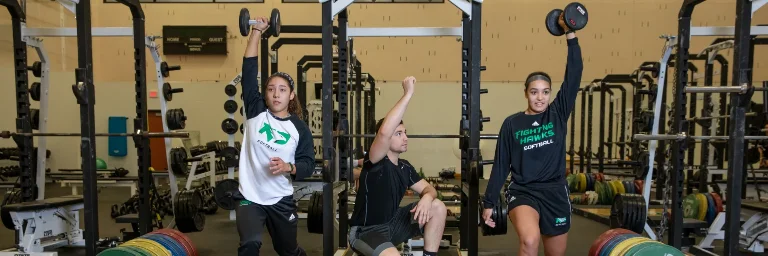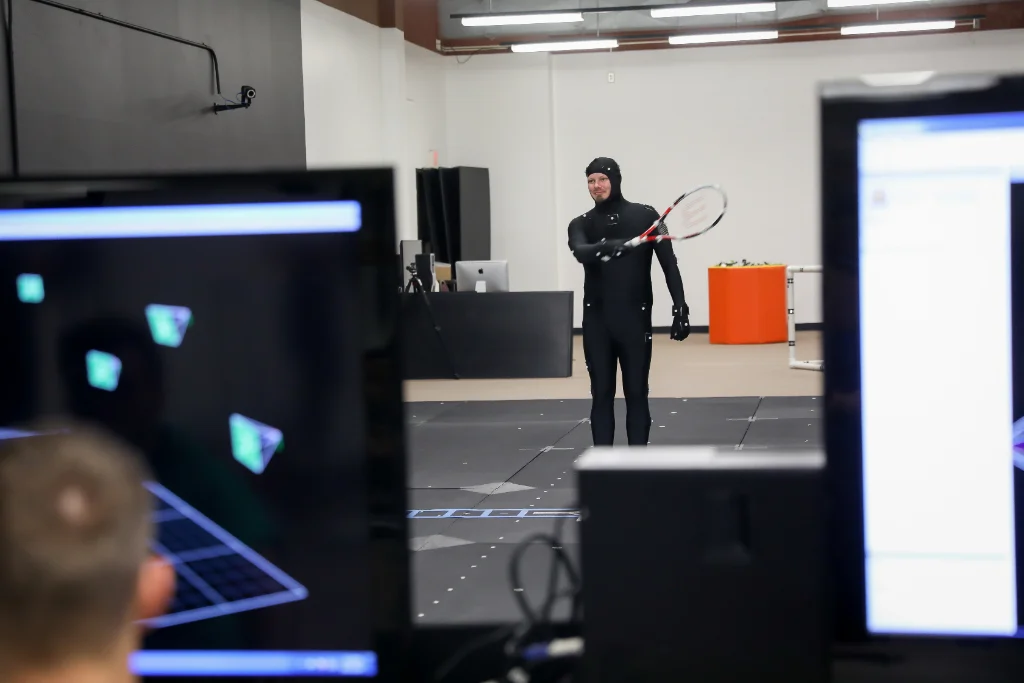
Kinesiology vs. Exercise Science: What's the Difference?
Understanding your body and its signals is crucial for maintaining optimal health and well-being.
Request Information
Whether it's deciphering subtle cues during exercise or understanding the complexities of human movement, disciplines like kinesiology and exercise science offer invaluable insights into the intricacies of the human body.
Grounded in the foundational principles of anatomy, physiology, and biomechanics, both kinesiology and exercise science converge in their examination of human movement and physical activity. However, each has a distinct focus and offers unique perspectives. So, read on as we explore the distinctions between kinesiology vs. exercise science, from education to skills, responsibilities, and more.
What is Kinesiology?
To understand what kinesiology is, let's begin by analyzing its name. Kinesiology, rooted in the Greek term "kinesis," signifying movement, and the suffix "-ology," denoting a science or branch of knowledge, is the scientific exploration of human movement and physical activity.
Kinesiology draws from various disciplines, such as anatomy, physiology, biomechanics, psychology, and sociology. It helps researchers and practitioners understand the complex dynamics of movement, including its anatomical, physiological, neurological, biochemical, biomechanical, neuromotor, and psychological aspects, all within the context of interaction with the environment.
What is Exercise Science?
Exercise science is a field that studies human movement and physical activity. It combines various disciplines, such as physiology, biomechanics, exercise psychology, and nutrition, to investigate the intricate mechanisms underlying the impact of exercise on different body systems.
For example, exercise physiologists evaluate how exercise affects physiological parameters like oxygen levels and heart rate through fitness assessments. While exercise physiology is a narrower subset of exercise science, it often serves as a degree of concentration within the field.
Despite misconceptions and overlaps with related fields like kinesiology and exercise physiology, exercise science maintains its focus on promoting wellness through fitness assessment, exercise prescription, and the prevention and management of chronic diseases.
What is the Difference Between Kinesiology and Exercise Science?
In the upcoming sections, we'll explore the difference between kinesiology and exercise science, offering insights into how these two fields differ and the unique pathways they each offer.
Education
Both kinesiology and exercise science programs provide a strong foundation for studying human movement and physical activity; however, they have some key differences.
For those interested in pursuing a career in kinesiology, the educational path typically begins with a bachelor's degree in Kinesiology or a related field. Such undergraduate programs provide students with a thorough understanding of human movement and physical activity, covering topics such as anatomy, physiology, biomechanics, motor control, exercise psychology, and sociocultural aspects of physical activity. Upon completing their bachelor's degree, some individuals may choose to further their education by pursuing graduate degrees, such as a master's in Kinesiology or a doctoral degree, allowing for deeper specialization and research opportunities.
On the other hand, the educational journey for exercise science often begins with a bachelor's degree specifically in exercise science or a closely related field, such as exercise physiology or sports science. Like kinesiology programs, undergraduate exercise science programs cover various courses related to human movement, such as anatomy, exercise physiology, biomechanics, sport psychology, and motor learning and control. However, exercise science programs typically place a greater emphasis on the application of scientific principles to optimize physical performance and improve health outcomes through exercise prescription and training techniques. Graduates of exercise science programs may also pursue advanced degrees, such as a master's or doctoral degree, to further specialize in their areas of interest.

Skill Set Requirement
To excel in kinesiology, individuals need to possess a diverse set of skills and abilities, including:
- Understanding human anatomy and physiology to comprehend the body's structure and function
- Proficiency in biomechanical analysis to assess movement patterns and mechanics
- Expertise in exercise programming to design effective fitness regimens tailored to individual needs
- Knowledge of psychological and sociocultural factors influencing physical activity to understand behavioral aspects of exercise participation
- Strong communication skills to accurately convey complex information to clients and colleagues
- Empathy and interpersonal skills to build rapport and trust with clients and team members
- Critical thinking and problem-solving abilities to address challenges and optimize exercise interventions
Meanwhile, a successful career in exercise science demands a specific skill set that includes:
- Proficiency in exercise physiology assessment to evaluate physiological responses to exercise
- Competence in fitness testing and prescription to design and implement appropriate exercise programs
- Understanding of biomechanics to analyze movement mechanics and prevent injury
- Knowledge of nutrition to guide dietary requirements for optimal performance
- Familiarity with exercise psychology and behavior change techniques to motivate and support individuals in adopting healthier lifestyles
- Strong organizational skills to manage client records, appointments, and program schedules
- Attention to detail to ensure accuracy in fitness assessments and exercise prescriptions
Job Responsibilities
Professionals in kinesiology hold various roles that contribute to physical health and performance. Although the exact duties may depend on the role, they often include the following:
- Conducting fitness assessments and designing exercise programs
- Enhancing athletic performance and preventing injuries
- Providing rehabilitation services and promoting mobility
- Analyzing movement patterns and optimizing performance
- Improving workplace efficiency and safety
On the other hand, individuals in exercise science commonly deal with the following obligations:
- Leading fitness sessions and providing personalized training
- Conducting clinical assessments and developing exercise prescriptions
- Conducting research and applying findings to optimize exercise programs
- Offering guidance on dietary requirements and meal plans
- Educating individuals on health-related topics and behavior-modification strategies
Work Environment
In kinesiology, professionals often work in hospitals, rehabilitation centers, sports performance facilities, research laboratories, universities, or schools, contributing to various aspects of physical health and performance. In contrast, individuals in exercise science commonly find employment in fitness centers, corporate wellness programs, healthcare facilities, research institutions, or educational institutions, where they play critical roles in promoting health and fitness through exercise interventions and education.
Job Outlook and Salary
When it comes to salary, individuals in exercise science tend to earn a higher average yearly pay in the United States, with an average of $58,974 compared to $36,567 per year for those in kinesiology. Yet, it's worth noting that specific roles within each field may offer different salary ranges.
Regarding job outlook, roles such as fitness trainers and instructors, which are commonly pursued by both exercise science and kinesiology graduates, are expected to experience significant growth. With a projected growth rate of 14%, much faster than average, individuals in these roles can anticipate ample job opportunities. However, the overall job outlook for other positions within exercise science and kinesiology may vary depending on factors such as specialization, industry demand, and geographic location.

Kinesiology vs. Exercise Science: Which One is Right for You?
When weighing the decision between kinesiology and exercise science, consider your strengths, interests, and long-term career aspirations. If you have a strong understanding of the complexities of human movement and enjoy exploring various aspects of physical activity, kinesiology might be a suitable field for you. On the other hand, if you are passionate about applying exercise physiology principles to improve fitness, health, and performance outcomes, exercise science could be more aligned with your goals.
Additionally, consider the potential for professional growth and advancement in each field. Explore the job market, career trajectories, and opportunities for further education or specialization to assess which path offers the best prospects for achieving your career goals.
Lastly, don't hesitate to seek advice from professionals currently working in the field, as well as academic advisors and mentors. Their insights and guidance can provide valuable perspectives and help you make a well-informed decision that aligns with your interests, strengths, and aspirations. By carefully considering these factors and seeking advice when needed, you can confidently choose the path that is right for you in either kinesiology or exercise science.
Conclusion
Overall, kinesiology and exercise science offer invaluable insights into understanding the human body and optimizing its performance. Whether one chooses kinesiology or exercise science, both paths offer tremendous opportunities for personal and professional growth.
If you're interested in pursuing kinesiology, consider exploring the programs offered by the University of North Dakota (UND). With options for both undergraduate and graduate studies, including an accelerated program combining a bachelor's and master's degree in Kinesiology, UND provides a platform to pursue and achieve your academic and career goals in this field.
FAQs
While internships are not always required, they are highly recommended for kinesiology or exercise science students. They provide valuable hands-on experience, networking opportunities, and insights into potential career paths within these fields.
Kinesiology and exercise science are crucial in preventing and managing chronic diseases by promoting physical activity and healthy lifestyle behaviors. Through exercise prescription, rehabilitation programs, and behavioral interventions, professionals in these fields help individuals improve their overall health, manage chronic conditions, and reduce disease risk factors.
Nutrition is integral to both kinesiology and exercise science as it directly impacts physical performance, recovery, and overall health. Professionals in these fields educate individuals on proper nutrition for fueling workouts, optimizing athletic performance, promoting muscle growth and repair, and supporting overall wellness.
Yes, sports performance is a specific area of study within kinesiology and exercise science. Professionals who specialize in sports performance focus on enhancing athletic performance, preventing injuries, and optimizing training regimens for athletes of all levels.